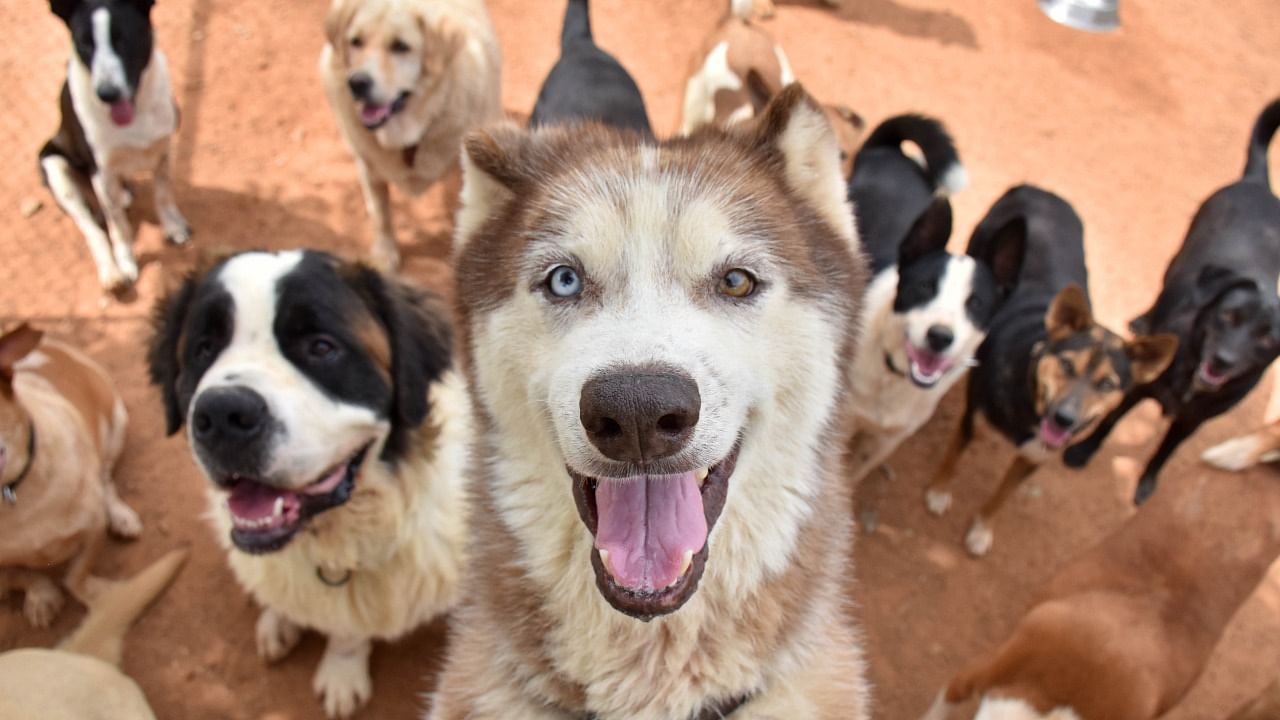
Representative image of dogs.
Credit: DH Photo/Janardhan B K
Illegal breeding of dogs has shot up since the pandemic, animal welfare activists say. Earlier this month, Cubbon Park police booked a couple breeding Shih Tzu puppies at home and selling them on Church Street.
Thejeshwar B, animal welfare warden, Karnataka Animal Welfare Board (KAWB), had reported the case. “An FIR and charge sheet have been filed. We are waiting for the court to take up the case. For now, we have temporary custody of the puppies,” he said.
A poster advertising black cocker spaniel pups came up at an apartment in Yeshwanthpur recently. When this journalist called the number on Monday, a woman said, “I have two pups left, priced between Rs 13,000 and Rs 15,000.” When Metrolife asked if she had a licence to breed dogs, she said she has a set-up at her home in Jalahalli and that her pet had given birth to six pups, so she was giving them away.
Activists say illegal breeders duck the scrutiny around licensing with stories like this.
Since April, Thejeshwar, who works with Second Chance Sanctuary, has been able to confiscate pups in 38 cases by taking the help of the police.“The other cases were breeder discards, that is, animals abandoned because they aren’t healthy. A staggering 99 per cent of them were females,” he said.
Aniruddha Ravindra, another KAWB animal welfare warden, gets 15-20 calls in a month flagging home breeding. “Most breeders are poor, living in slums. Home breeding became lucrative during the pandemic. Labradors and golden retrievers are popular, with one pup fetching anywhere between Rs 5,000 and Rs 40,000,” said Aniruddha, who works with CARE. Thejeshwar has also seen rich folks, owning multiple cars, breeding dogs illegally.
Registration norms
An establishment needs to meet a number of requirements before it can lawfully breed dogs. These include proper ventilation, lighting, and food storage. They should also be able to provide vet support and inspection, and dispose of animals that die. Breeders must first register with KAWB before obtaining a licence from the BBMP.
A source in the animal husbandry and veterinary services department told Metrolife that there are no more than four registered breeders in Karnataka.
A BBMP official said it is difficult to identify and crack down on backyard breeders until pet dog licensing is made compulsory. “We sent a proposal to the urban development department in 2021 but nothing has happened since,” he said. Metrolife has learnt that Society for the Prevention of Cruelty to Animals has been in talks with some vets to help flag suspected cases of illegal breeding.
Inside the nexus
Animal welfare activists say the laws are not stringent. Some allege the police, politicians and even veterinarians are complicit. Activists find it difficult to confront the nexus. “Sometimes, these breeders slap a case against us,” Sujaya Jagadish said. She has also heard of illegal breeders abducting dogs from buyers and to resell them. Sadhana Hegde, another activist, says some breeders misuse apps designed for scheduling pet playdates to find partners for the animals to mate.
No place to rehome
A big hurdle to confiscations is the lack of arrangements to rehome confiscated dogs, cats and birds.
Sadhana says court cases can go on for years and so the government should set up shelters to house these animals and birds in the meantime. “There was talk of a temporary shelter in Hebbal but there has been no progress on this project,” she said.
What's the punishment?
While reporting of illegal breeding has gone up, conviction rates remain low. Of the 40 cases animal welfare warden Aniruddha has filed in the last three years, only two have resulted in home breeders being brought to book. “Both were based in south Bengaluru. They paid a fine of Rs 50 each and got away,” he said. Dog Breeding and Marketing Rules, 2017, doesn’t talk of punishment for illegal breeding. That is why activists file cases under the Prevention of Cruelty to Animals Act of 1960.“This says Rs 50 is the maximum penalty and breeders undergo up to three months imprisonment if they can’t pay up,” Aniruddha explained.
Call 82771 00200 (Animal Husbandry And Veterinary Services), 080 2266 0000 (BBMP), 112 (Emergency number).